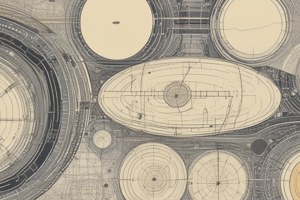Podcast
Questions and Answers
What are derived units in physics?
What are derived units in physics?
- Units derived from experimental observations
- Units derived from technological advancements
- Units derived from chemical properties
- Units derived from pure mathematical operations (correct)
Why is understanding the difference between scalar and vector measures important in physics?
Why is understanding the difference between scalar and vector measures important in physics?
- To design new experiments
- To interpret results accurately (correct)
- To improve computer programming
- To predict natural disasters
What is the function of an ohmmeter in physics?
What is the function of an ohmmeter in physics?
- Measure light wavelengths
- Measure electrical resistance (correct)
- Measure time intervals
- Measure voltage
Which career in physics involves applying principles of physics to diagnose and treat diseases, especially in cancer therapy?
Which career in physics involves applying principles of physics to diagnose and treat diseases, especially in cancer therapy?
What is one way individuals can prepare for a career in physics research based on the text?
What is one way individuals can prepare for a career in physics research based on the text?
Which type of physicists model complex systems using computers for simulations and predictions?
Which type of physicists model complex systems using computers for simulations and predictions?
What is the primary role of measurements in physics?
What is the primary role of measurements in physics?
Which element of measurements in physics refers to the closeness of measured values to true values?
Which element of measurements in physics refers to the closeness of measured values to true values?
What type of quantity has both magnitude and direction in physics?
What type of quantity has both magnitude and direction in physics?
Which aspect of measurements in physics ensures consistency of repeated measurements?
Which aspect of measurements in physics ensures consistency of repeated measurements?
What do scalar measures represent in physics?
What do scalar measures represent in physics?
Why is establishing standardization important in measurements in physics?
Why is establishing standardization important in measurements in physics?
Flashcards are hidden until you start studying
Study Notes
Understanding the Physical World Through Measurements
Physics, the scientific discipline exploring the nature and behavior of matter and energy, relies heavily on measurements to understand the physical world. These measurements enable us to quantify phenomena, validate theories, and predict outcomes based on known relationships among variables. Let's delve deeper into the realm of physics and its dependence on measurement.
Defining Measurement in Physics
Measurement in physics involves assigning numbers to physical quantities based on comparison with a standard. This process allows scientists to compare observations and reproduce experiments, ensuring consistent and reliable findings. Key elements of measurements in physics include:
- Standardization: Establishing base values against which other values can be compared.
- Accuracy: Closeness of measured values to true values.
- Precision: Consistency of repeated measurements.
- Uncertainty: Limitations on the precision and accuracy of a measurement.
These aspects ensure that measurements contribute solid evidence to advance our understanding of the universe.
Types of Quantitative Measures
In physics, several types of quantitative measures exist, including:
- Scalar Measures: Single numerical values representing quantities like mass, distance, temperature, etc.
- Vector Measures: Quantities that have both magnitude and direction, such as force, velocity, momentum, etc.
- Derived Units: Mathematical combinations of basic units, derived from pure mathematical operations, e.g., speed = distance / time.
Understanding the difference between scalar and vector measures is crucial for correctly interpreting results and drawing accurate conclusions.
Tools Used in Physics Measurements
A variety of instruments aid physicists in taking precise measurements:
- Mechanical Devices: Balances (mass), rulers (distance), thermometers (temperature), etc.
- Electrical Equipment: Voltmeter (voltage), ohmmeter (electrical resistance), multimeter (multiple electrical characteristics), etc.
- Atomic Clocks: Highly precise devices used to measure time intervals.
- Optical Equipments: Lasers, spectrometers (light wavelengths), photodiodes (photon detection), etc.
Each tool serves a specific purpose and contributes to our comprehensive understanding of the natural world.
What Scientific Careers Require Knowledge of Measurements in Physics?
Several careers in the field of physics rely on a strong foundation in measurements:
- Experimental Physicists: Design, build, and test apparatus to gather data for further analysis.
- Applied Physicists: Develop solutions to practical problems, utilizing knowledge gained from experimentally verified physical laws.
- Medical Physicists: Apply principles of physics to diagnose and treat diseases, particularly involving radiation therapy in cancer treatment.
- Computational Physicists: Model complex systems and processes using computers, allowing simulations and predictions to guide experimental strategies.
Assisting in experimental or theoretical research requires proficiency in measurement techniques, instrument operation, and data interpretation.
Exploring a Career in Physics Research
For individuals considering a career in physics research, it's beneficial to familiarize oneself with various subfields, attend conferences, engage in discussions with researchers, and seek out internships and research experiences. Pursuing graduate studies can lead to rewarding roles in academia, industry, healthcare institutions, government agencies, or independent laboratories.
Studying That Suits You
Use AI to generate personalized quizzes and flashcards to suit your learning preferences.




